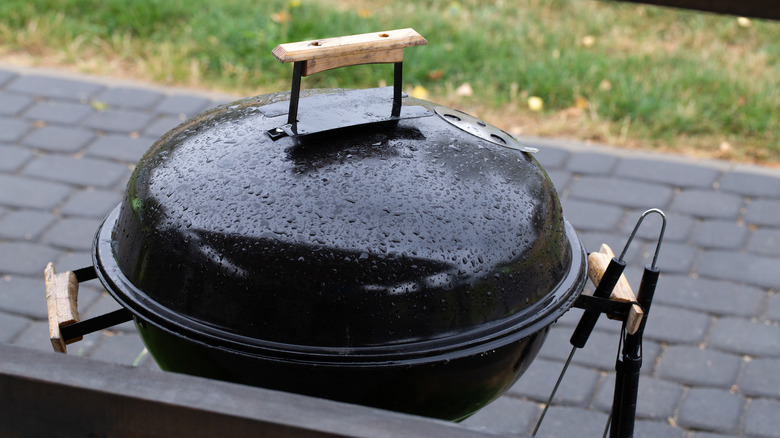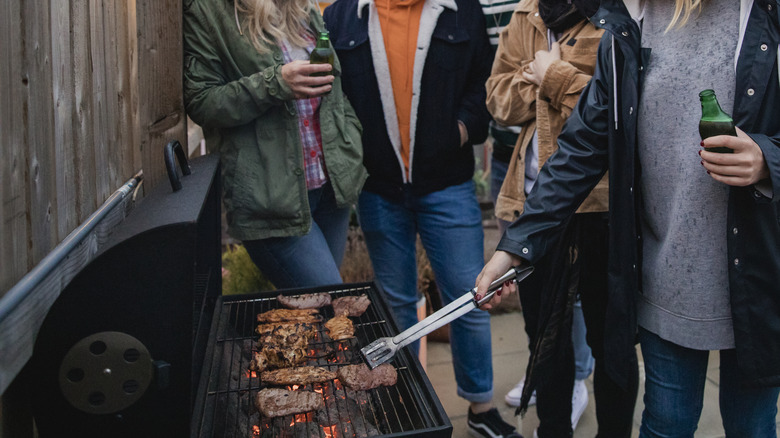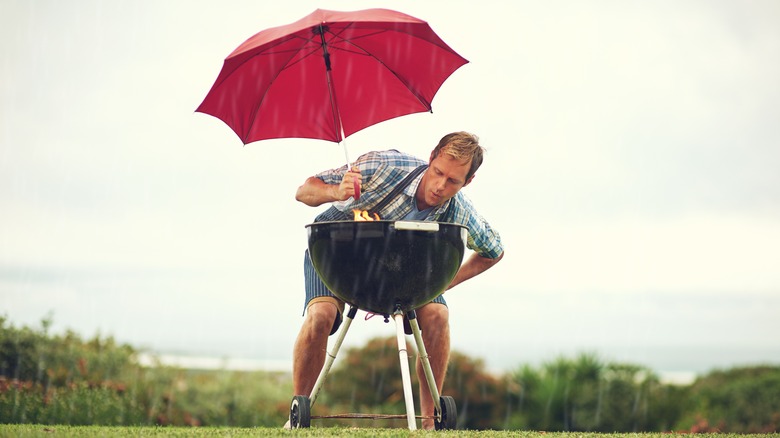The Set-Up You Need For Successful Grilling In The Rain
You can plan a barbecue as much as you like, but the weather gets the final say. Suppose you've got a big group of people coming and the whole day planned out, but there are storm clouds, and it's drizzling. What now?
If you're using a charcoal or gas grill and the rain isn't torrential, then the day's not ruined. It's doable to barbecue or grill in lousy weather, so long as you're blocking the flames from rain and wind and taking precautions to deal with any of the elements that will sneak through those covers. The easiest way to do that is to keep the lid or cover down more often than you normally might, but if you've got access to a gazebo or canopy, it certainly helps to move the party underneath them. If you don't have access to anything fancy like that, there are still tips you can use.
Keep in mind that none of these suggestions will apply to electric grills, which should never be used in the rain. Any electric grill manufacturer will warn against liquids of any kind coming into contact with the cords, plug, or heating elements.
Keep the grill hot when it's cold out
Make sure your grill is hotter than you'd normally set it. Some rainwater is likely to get into the grill through its air vents, and it's probably colder outside with the wind and lack of sun — these can both lower the temperature you'd cook at if it were sunny, and you don't want to undercook your meat. If you're using a charcoal grill, adding extra briquettes will heat it up enough to make up for the elements cooling it down. Light it up early, too: The charcoal will get damp, and this can help dry it off. With gas grills, check to make sure they'll go high enough beforehand because charcoal grills beat gas grills when it comes to reaching high temperatures.
If you don't have a remote thermometer, it might be useful to get one. You can place a small probe inside the grill, and it connects via cord or Bluetooth to a display, which lets you check the grill's temperature without opening the lid. Otherwise, a regular meat thermometer still works because there are lots of new factors that will affect its temperature.
Staying safe and dry while grilling
It may be a grilling myth that you can't do anything in rain or cold weather, but sheltering your grill always helps, even if it's crude. Ask a friend to hold an umbrella over the grill while you're flipping patties, or set up a patio umbrella overhead. A wind blocker can also reduce interference while you're working with the meat (if you use a tarp or anything flammable, keep it far enough away to not be a hazard). The lid will be kept down more than it would on a sunny day, both to keep the precious heat inside and the disruptive cold outside, which means you'll be flipping the meat less, so be prepared for that.
A few more safety warnings: Never bring the grill indoors, not even into your garage. Beyond creating a fire hazard, any grill with open flames will also have smoke, which could fill the room. Charcoal grills and propane grills also produce a decent amount of carbon monoxide, which would build up inside and cause serious illness if inhaled. And don't grill in a thunderstorm, snowstorm, or any other serious weather. If it gets that bad, you're better off postponing the barbecue or firing up your kitchen stove indoors.


